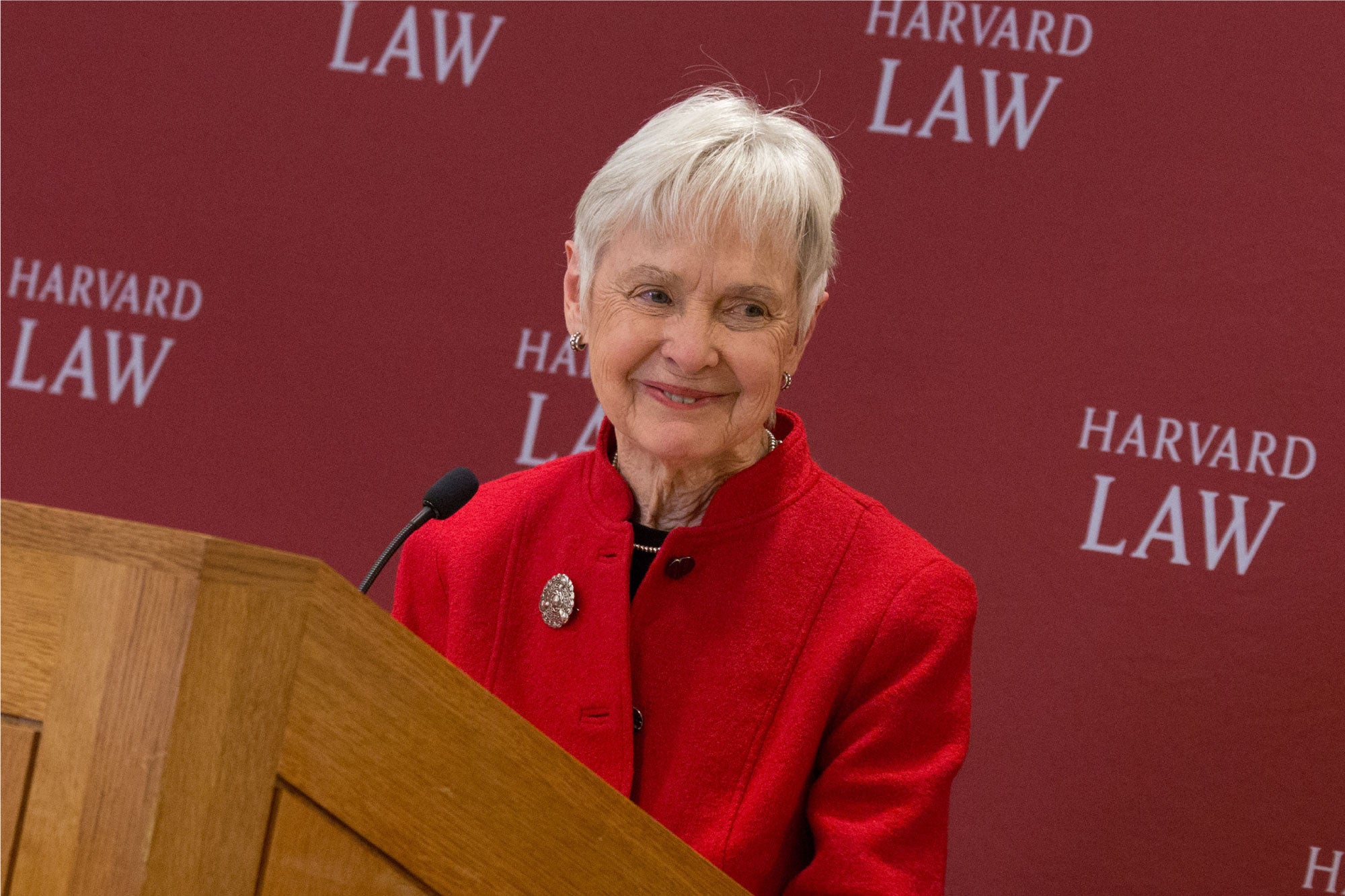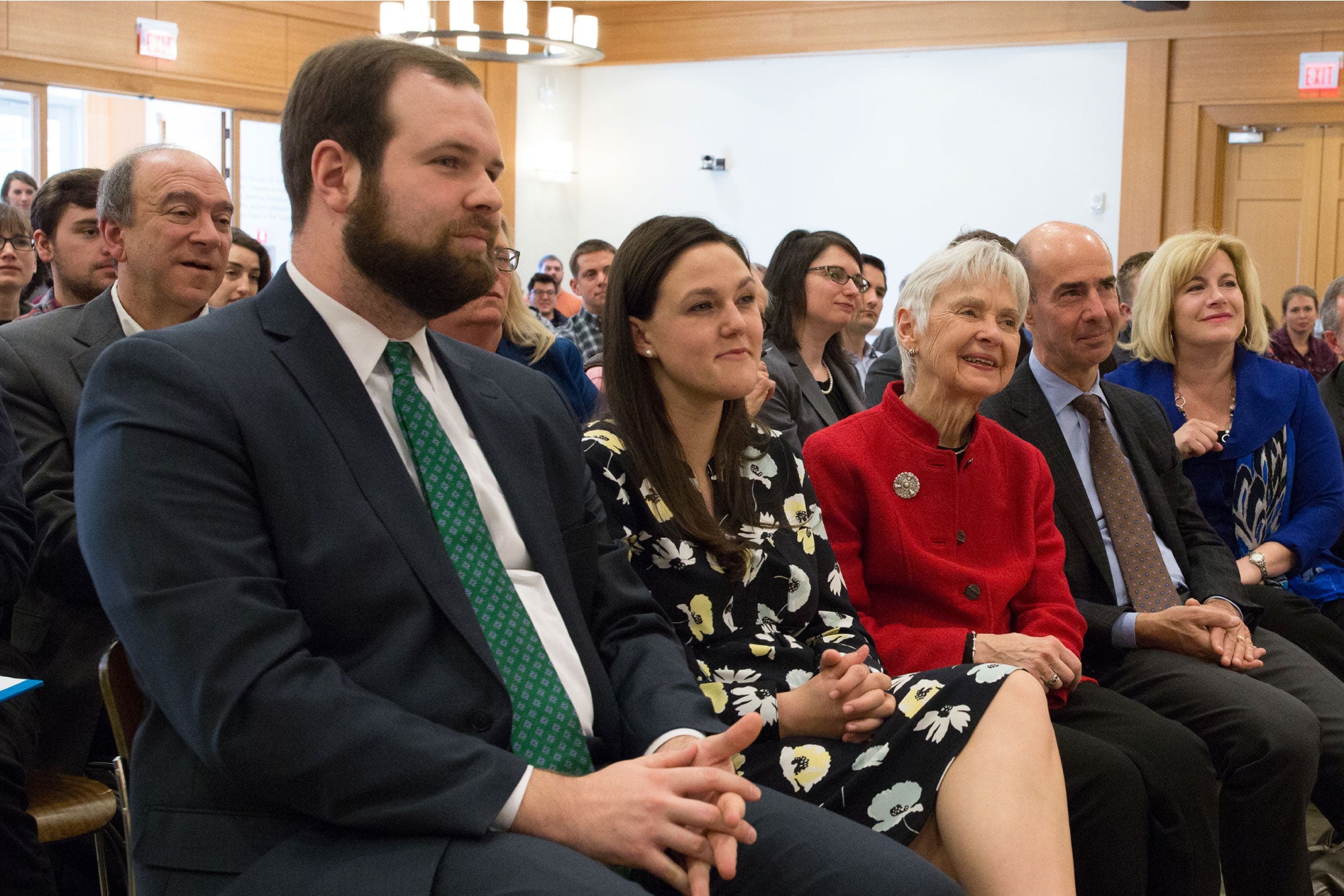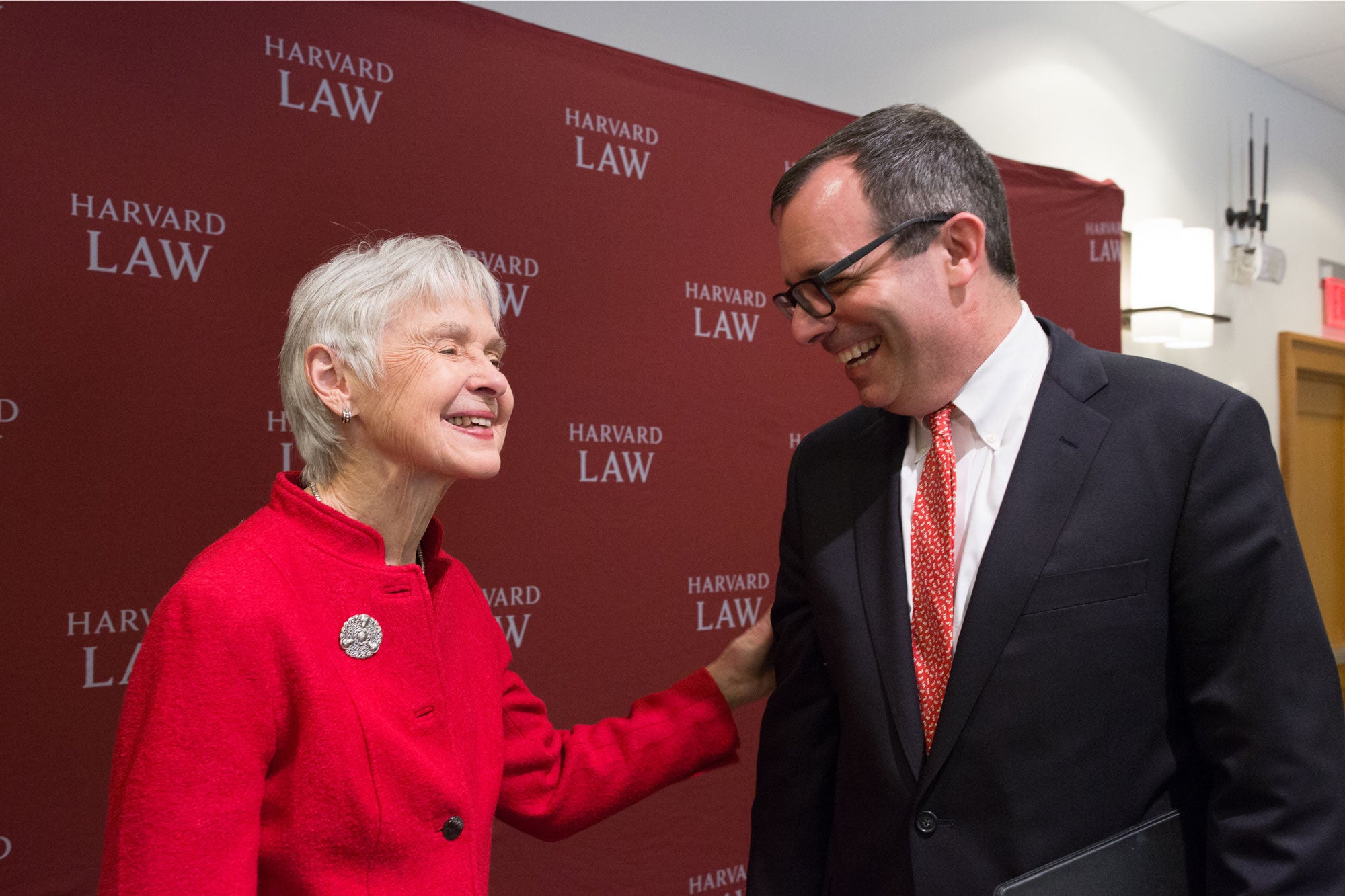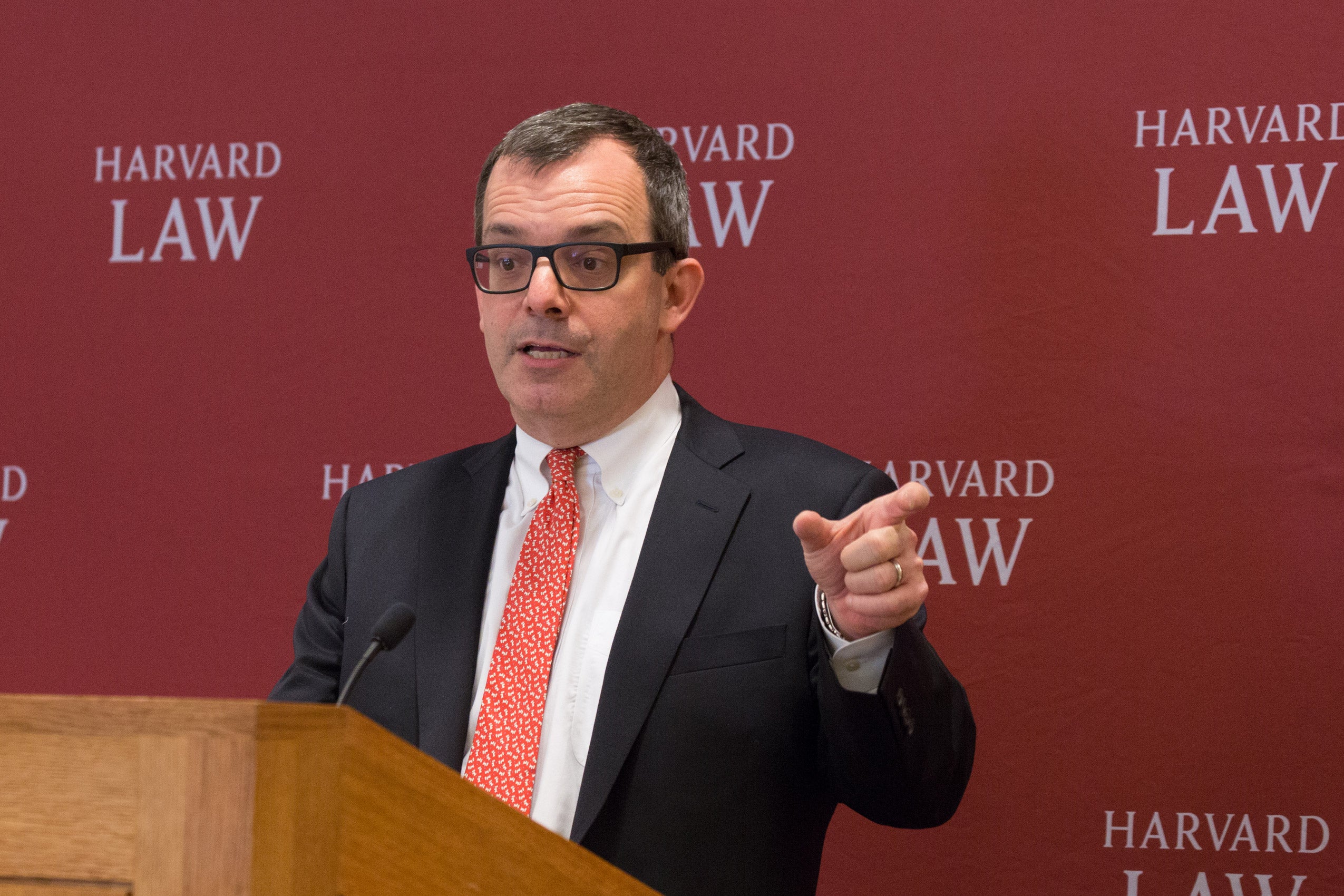On March 6, John Manning ’85, Harvard Law School deputy dean and Bruce Bromley Professor of Law, delivered a talk, “Without the Pretense of Legislative Intent,” as part of the Scalia lecture series at HLS. Manning, an expert in administrative law, statutory interpretation, separation of powers law and the federal courts, served as a law clerk for the late Justice Antonin G. Scalia ’60 from 1988 to 1989.
The lecture series was established in 2013 to promote and advance the understanding of the founding principles and core doctrines of the U.S. Constitution. This year’s Scalia lecture was the first since the death of Justice Scalia on Feb. 13, 2016.
In her introduction, Harvard Law School Dean Martha Minow said: “It is meaningful for us to host this event today and to mark the enduring legacy of this extraordinary Justice.”
Minow also announced that the Scalia family will donate his papers to the Harvard Law School Library. Several members of the justice’s family were present for the announcement, including his wife, Maureen. “He learned to love the law here as a student; He learned how law should be taught and he loved to teach law, so this has a great deal of meaning to us,” said Mrs. Scalia. She also noted that it was at a Harvard Law Review reception 58 years ago where she first met her husband, when he was a third-year law student. “That was the beginning of our adventure together,” she said.

Credit: Martha Stewart Maureen Scalia
The collection, which includes judicial papers from Justice Scalia’s tenures on the Supreme Court and on the U.S. Court of Appeals for the D.C. Circuit, will be made available for research on a schedule agreed upon by the Scalia family and the Harvard Law School Library. Materials pertaining to Justice Scalia’s work on the Supreme Court and the D.C. Circuit Court will begin to be opened for research in 2020, although materials regarding specific cases will not be opened during the lifetime of other Justices or judges who participated in the case.
Manning said: “I want to join Dean Minow in thanking the Scalia family for the incredible honor of entrusting Harvard Law School with the Justice’s historic papers,” he said. “Once the archive is open, I know that generations of scholars will come to Harvard Law School to study the record of Justice Scalia’s historic tenure on the Supreme Court.”

Credit: Martha Stewart Scalia family members in attendance at this year’s lecture were (L-R) Will Courtney, Katie Courtney, Maureen Scalia, Euguene Scalia and Trisha Scalia.
In his talk, Manning discussed how legislative intent had long been the touchstone of federal statutory interpretation. “In the years before Justice Scalia joined the Court, intentionalism had grown into an art form,” said Manning. “The Court had come to trust legislative history, especially the statements made by a bill’s drafters.”
According to Manning, the legislative history approach offended Justice Scalia’s sense of formalism. A leading exponent of modern textualism, Scalia believed that treating legislative history as conclusive evidence of intent gave it the same force and effect as the text passed by Congress, even though the legislative history did not go through bicameralism and presentment, as required by Article 1 of the U.S. Constitution. He believed judges must abandon any pretense of using intent as the basis for interpretation. “More generally, and more importantly,” said Manning. “the very idea of legislative intent offended Justice Scalia’s admittedly less well-known sense of legal realism.”
“This idea, this intent skepticism, is heavily associated with Justice Scalia and with his close intellectual ally, Judge Frank Easterbrook. It’s thought to be a cornerstone of modern textualism, and most of the many critiques of intent skepticism that you see in the law journals today frame their arguments specifically as responses to textualism,” said Manning. “This emphasis, however, overlooks the fact that Justice Scalia’s intent skepticism itself reflected a very deeply-rooted intellectual tradition and in particular, a very deeply-rooted intellectual tradition at his alma mater, Harvard Law School.”
In connection with Harvard Law School’s upcoming Bicentennial celebration, Manning is writing an article on the history of statutory interpretation at Harvard Law School for a Bicentennial issue of the Harvard Law Review, scheduled for Fall 2017. As part of his talk, Manning shared his research on how HLS scholars –including Roscoe Pound, dean of Harvard Law from 1916 to 1936; James Landis ’24, dean of Harvard Law School from 1938 to 1946; Professor Henry Hart Jr. LL.M. ’30 S.J.D. ’31; and Albert Sacks, dean of Harvard Law from 1971 to 1981 — viewed the question of statutory interpretation.
“Justice Scalia came by his intent skepticism honestly. It reflects a deeply-rooted anti-legislative intent impulse that cuts across generations of Harvard scholars and across the highly diverse array of approaches of Harvard’s legal realists, progressives, New Dealers, Legal Process purposivists and ultimately, also its textualists,” said Manning. “It’s impressive in part because of the importance of the thinkers, and in part because of how broadly different approaches build upon its premises.”
Manning noted, for example, that Roscoe Pound, dean of Harvard Law from 1916 to 1936, and one of the leaders of the progressive movement, was known for sociological jurisprudence, the idea that judges should interpret statutes in light of social realities and the imperatives of justice, not the formalities of the statutory texts. Yet Pound wrote that in hard cases the legislature has “no actual intent.” He also wrote that “the difficulties of so-called interpretation arise only when the legislature has had no meaning at all.”
According to Manning, the question of how to read a statute is not a factual, but a normative question — something that requires a theory of legislation, as well as a theory of adjudication. Without the pretense of legislative intent, Harvard scholars have argued that what is really at stake in statutory interpretation, is power and its allocation between Congress and the courts in our system of government, said Manning.

Credit: Martha Stewart Maureen Scalia and John Manning
The Scalia Lecture series, funded by an anonymous donor, began in 2014. Justice Scalia’s last appearance at Harvard Law School was in November of 2014, when he came for the inaugural lecture established in his honor. That day, he was in the audience to hear Judge Frank Easterbrook of the Seventh Circuit Court of Appeals, his longtime friend and colleague, deliver the inaugural lecture. During that same visit, Justice Scalia judged the final round of the Law School’s 2014 Ames Moot Court Competition. In 2015, Associate Justice of the U.S. Supreme Court Elena Kagan ’86, former dean of Harvard Law School, discussed statutory interpretation in a conversation with Manning, as part of the Scalia Lecture series. The series will include one lecture per year for ten years, with speakers drawn from the fields of political science, history, philosophy, law, government, religion and related disciplines.
Last February, after Justice Scalia’s passing, Manning joined a panel of Harvard Law School professors, all of whom had personal or professional connections to the late Justice, to remember Scalia’s life and work. The panelists included Harvard Law School Professor Emeritus Frank Michelman ’60, a former classmate of Scalia; Professors Lawrence Lessig, and Adrian Vermeule ’93, who served as Scalia’s law clerks; Professors Charles Fried and Richard Lazarus ’79, who argued cases in Scalia’s court; and Professor Cass Sunstein ’78, who served on the law faculty with Scalia at the University of Chicago. Harvard Law School Dean Martha Minow moderated.
A member of the American Academy of Arts and Sciences, Manning is the author of many works, including “Legislation and Regulation” (Foundation Press, 2010, with Mathew Stephenson ’03), and “Hart and Wechsler’s The Federal Courts and the Federal System” (Foundation Press, 6th ed., 2009, with David L. Shapiro, Richard H. Fallon and Daniel J. Meltzer). He began teaching at HLS as a visiting professor in 2002. He was named a professor of law in 2004, received the Bruce Bromley chair in 2007, and became deputy dean in 2013. He served for two years (1986-88) in the Office of Legal Counsel under the assistant attorney general and for almost three years (1991-94) in the Office of the Solicitor General. In addition to clerking for Justice Scalia, he served as a law clerk to Judge Robert H. Bork at the United States Court of Appeals for the District of Columbia Circuit.
